Jamaica
Authors: Malcolm Braff, Bruno Cathala & Sebastien Pauchon
Publisher: Pro Ludo
Year: 2008
review by

| x |
|
|
|
|
|
|
|
|
|
|
|
|
|
|
|
|
|
|
|
|
|
|
|
|
|
|
|
|
|
|
|
|
|
|
|
|
|
|
|
|
|
|
|
|
|
|
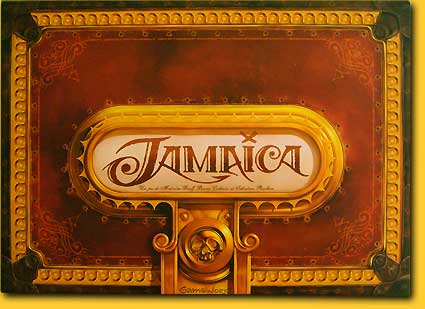 |
The seas around Jamaica are full of ships that carry valuable cargo, and therefore, hoards of pirates that would like a share of the riches roam the area. In line with their competitive spirit, the pirate gangs have organised a race around the island, with the sole purpose to collect as much gold as possible. |
|
| x |
|
|
|
|
|
|
|
|
|
|
|
|
|
|
|
|
|
|
|
|
|
|
|
|
|
|
|
|
|
|
|
|
|
|
|
|
|
|
|
|
|
|
|
|
|
|
| Of course, violence is part of the deal: as soon as two ships are in each other’s vicinity, the canons are loaded immediately! The defeated ship can expect a friendly visit from their victors; this way, the gold that the pirates collect during the race frequently changes from one owner to another... Not the first ship to pass the finish line, but the ship with the most valuable cargo wins the race! |
|
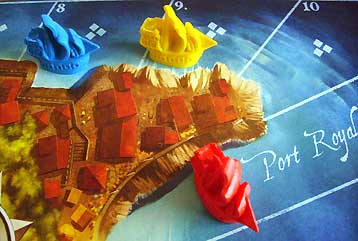 |
|
| x |
|
|
|
|
|
|
|
|
|
|
|
|
|
|
|
|
|
|
|
|
|
|
|
|
|
|
|
|
|
|
|
|
|
|
|
|
|
|
|
|
|
|
|
|
|
|
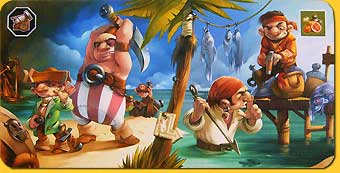 |
|
On the game board, we see a racing track in the waters around the island of Jamaica. Everybody starts with his ship in Port Royal, equipped with only the basic supplies: some food and a modest sum of money. All players receive a set of cards in their colour, of which they draw three. On each card, two actions are depicted: the first action should be carried out during the day, and the second action during the evening. Possible actions are moving forward, moving backwards, load gold, food, or gunpowder. |
|
| x |
|
|
|
|
|
|
|
|
|
|
|
|
|
|
|
|
|
|
|
|
|
|
|
|
|
|
|
|
|
|
|
|
|
|
|
|
|
|
|
|
|
|
|
|
|
|
| How far a player should move, and how much items he is allowed to load, is determined by two dice. The starting player throws the dice, and decides which of the two dice is to be used for the day action, and which one for the evening-action. He places the dice on the ‘sun’ and ‘moon’ boxes on the island. Then, all players choose one of their three hand cards, and place it face down in front of them. The starting player first reveals his card, and carries out his day action, followed by his evening action. |
|
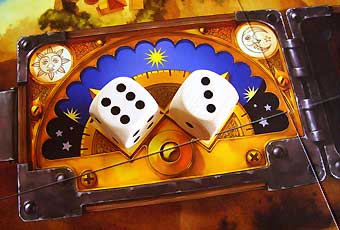 |
|
| x |
|
|
|
|
|
|
|
|
|
|
|
|
|
|
|
|
|
|
|
|
|
|
|
|
|
|
|
|
|
|
|
|
|
|
|
|
|
|
|
|
|
|
|
|
|
|
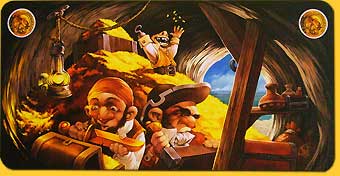 |
|
Subsequently, all the other players carry out their actions, but they have to use the numbers determined by the die-throw of the starting player, and they also have to stick to his choice for the day- and evening die. After performing both their actions, players draw a new card from their stack, the starting player shifts to the left, and the next round begins again with throwing the two dice. |
|
| x |
|
|
|
|
|
|
|
|
|
|
|
|
|
|
|
|
|
|
|
|
|
|
|
|
|
|
|
|
|
|
|
|
|
|
|
|
|
|
|
|
|
|
|
|
|
|
| The actions in more detail: when moving forward or backwards, the player moves his ship as many spaces as determined by the relevant die. The best-case scenario is that his ship ends on one of the nine spaces that contain a treasure chest. The first player to reach a treasure chest removes the token from the board, and draws a treasure card. There are treasures that contain victory points, or penalty points (cursed treasures). The player keeps his treasure card facedown until the end of the game. But if he ends on a space that depicts a certain amount of gold or food, he has to pay this amount from the holds of his ship. If he doesn’t have enough food or gold, he must pay everything he has, and as a penalty, he must go back on the track until he reaches a space that he can pay for. |
|
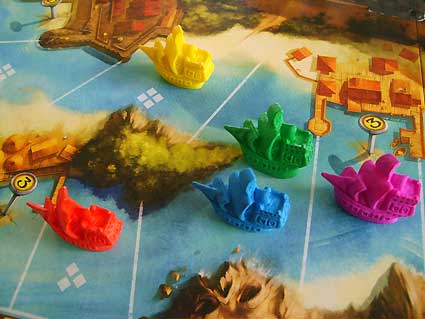 |
|
| x |
|
|
|
|
|
|
|
|
|
|
|
|
|
|
|
|
|
|
|
|
|
|
|
|
|
|
|
|
|
|
|
|
|
|
|
|
|
|
|
|
|
|
|
|
|
|
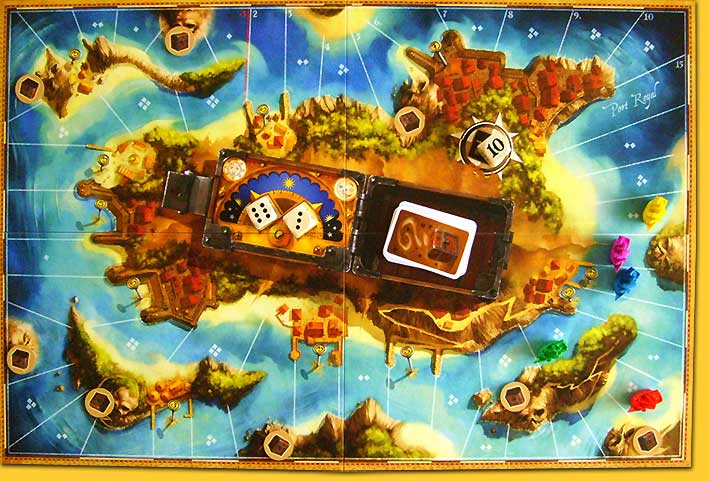 |
| x |
|
|
|
|
|
|
|
|
|
|
|
|
|
|
|
|
|
|
|
|
|
|
|
|
|
|
|
|
|
|
|
|
|
|
|
|
|
|
|
|
|
|
|
|
|
|
| To make it even worse: if a player enters a space occupied by the ship of another player, they have to fight a battle. The active player is the attacker, whether he likes it or not. He decides how many gunpowder tokens from his holds he wants to use, and he throws the battle die. The gunpowder tokens are added to the result. Then, the defender decides how many gunpowder tokens he wants to use, and he also throws the combat die. The player with the highest total wins the battle; he may steal the contents of the other player’s holds, or steal a treasure card, or dump a treasure card with penalty points on the opponent. The active player, however broke, damaged and defeated he may be, then continues his turn. |
|
| x |
|
|
|
|
|
|
|
|
|
|
|
|
|
|
|
|
|
|
|
|
|
|
|
|
|
|
|
|
|
|
|
|
|
|
|
|
|
|
|
|
|
|
|
|
|
|
 |
| x |
|
|
|
|
|
|
|
|
|
|
|
|
|
|
|
|
|
|
|
|
|
|
|
|
|
|
|
|
|
|
|
|
|
|
|
|
|
|
|
|
|
|
|
|
|
|
|
When loading food, gunpowder or gold, we take as much tokens as indicated by the day- or evening die. But the storage can pose a problem: each ship has only five holds, and when something new is loaded, it has to be placed into an empty hold. If there is no empty hold available, the player has to throw something overboard to make room! The player may decide what items he discards, but it may not be of the same kind as the new item that you want to store. When taking five gold, you may not empty a hold that contains only one gold to make room for the five gold, but you have to discard food or gunpowder instead...
|
|
| x |
|
|
|
|
|
|
|
|
|
|
|
|
|
|
|
|
|
|
|
|
|
|
|
|
|
|
|
|
|
|
|
|
|
|
|
|
|
|
|
|
|
|
|
|
|
|
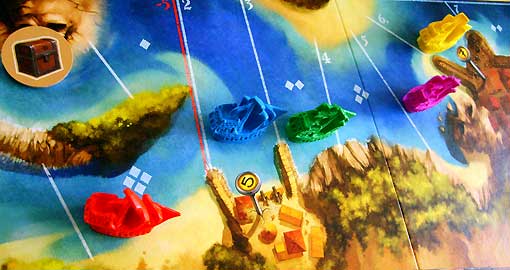 |
|
As soon as a ship crosses the finish line, the race is over. The player that finished first gets 15 points, and all other players that are also close to the finish get between 2 and 10 points, and all players that were lagging hopelessly behind get five penalty points for their poor performance. Then, all players add up the gold in their holds and the points and penalty points on their treasure cards, and the ship with the highest total wins the game! |
|
| x |
|
|
|
|
|
|
|
|
|
|
|
|
|
|
|
|
|
|
|
|
|
|
|
|
|
|
|
|
|
|
|
|
|
|
|
|
|
|
|
|
|
|
|
|
|
|
| x |
|
|
|
|
|
|
|
|
|
|
|
|
|
|
|
|
|
|
|
|
|
|
|
|
|
|
|
|
|
|
|
|
|
|
|
|
|
|
|
|
|
|
|
|
|
|
| x |
|
|
|
|
|
|
|
|
|
|
|
|
|
|
|
|
|
|
|
|
|
|
|
|
|
|
|
|
|
|
|
|
|
|
|
|
|
|
|
|
|
|
|
|
|
|
 |
|
|
|
|
|
|
|
|
|
|
|
|
|
|
|
|
|
|
|
|
|
|
|
|
|
|
|
|
|
|
|
|
|
|
|
|
|
|
|
|
|
|
| Jamaica can be filed as a ‘hilarious family game’, especially with five or six players. In the first part of the race, everybody is so close together, with a continuous battle as result. And it’s not much more than that; we are completely dependent on the die throw of the starting player, and with only three cards, it’s not always possible to make the best of it. Sometimes you are forced, by lack of other options, to make a completely destructive move. If all you three cards display ‘move forward’ as day-action, this might mean that you are forced to move to a space where you cannot afford the costs. |
|
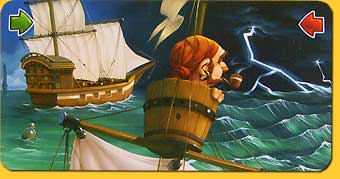 |
| x |
|
|
|
|
|
|
|
|
|
|
|
|
|
|
|
|
|
|
|
|
|
|
|
|
|
|
|
|
|
|
|
|
|
|
|
|
|
|
|
|
|
|
|
|
|
|
| This will cause you to be moved backwards, right into the arms of at least three other players, and again you have to rely on the fickle dice. Unless you have Lady Luck as your ally, this will most probably leave you completely broke, and even further away from the finish than when you started your turn... extremely frustrating, especially if it happens to you three times in a row. |
|
| x |
|
|
|
|
|
|
|
|
|
|
|
|
|
|
|
|
|
|
|
|
|
|
|
|
|
|
|
|
|
|
|
|
|
|
|
|
|
|
|
|
|
|
|
|
|
|
Jamaica looks very nice, and the mechanism with the day and evening action determined by the die throw of the starting player is quite inventive. A funny detail is that the rulebook has been designed as a treasure map, where the different chapters are printed on different islands on the map. However, this is not at all funny anymore if you are trying to look up some detail in the rules during the game, because then you have this huge sheet of paper sweeping all over the board. But, if you aim carefully, this can also have its advantages when your ship suddenly is at a treasure location!
© 2008 Barbara van Vugt
Jamaica, Malcolm Braff, Bruno Cathala & Sebastien Pauchon, Pro Ludo, 2007 - 2 to 6 players, 8 years and up, 30 - 60 minutes
|
 |
|
|
|
|
|
|
|
|
|
|
|
|
|
|
|
|
|
|
|
|
|
|
|
|
|
|
|
|
|
|
|
|
|
|
|
|
|
|
|
|
|
|
|
|
|
|
|
  |
|
|
|
|
|
|
|
|
|
|
|
|
|
|
|
|
|
|
|
|
|
|
|
|
|
|
|
|
|
|
|
|
|
|
|
|
|
|
|
|
|
|
  |
Cosy and playful family game; beautiful and carefully produced game |
  |
|
|
|
|
|
|
|
|
|
|
|
|
|
|
|
|
|
|
|
|
|
|
|
|
|
|
|
|
|
|
|
|
|
|
|
|
|
|
|
|
|
|
  |
|
|
|
|
|
|
|
|
|
|
|
|
|
|
|
|
|
|
|
|
|
|
|
|
|
|
|
|
|
|
|
|
|
|
|
|
|
|
|
|
|
|
| x |
|
|
|
|
|
|
|
|
|
|
|
|
|
|
|
|
|
|
|
|
|
|
|
|
|
|
|
|
|
|
|
|
|
|
|
|
|
|
|
|
|
|
|
|
|
|
Also read the  |
|
|
|
|
|
|
|
|
|
|
|
|
|
|
|
|
|
|
|
|
|
|
|
|
|
|
|
| x |
|
|
|
|
|
|
|
|
|
|
|
|
|
|
|
|
|
|
|
|
|
|
|
|
|
|
|
|
|
|
|
|
|
|
|
|
|
|
|
|
|
|
|
|
|
|
| x |
|
|
|
|
|
|
|
|
|
|
|
|
|
|
|
|
|
|
|
|
|
|
|
|
|
|
|
|
|
|
|
|
|
|
|
|
|
|
|
|
|
|
|
|
|
|
 |
|
|
|
|
|
|
|
|
|
|
|
|
|
|
|
|
|
|
|
|
|
|
|
|
|
|
|
|
|
|
|
|
|
|
|
|
|
|
|
|
|
|
 |
|
|
|
|
|
|
|
|
|
|
|
|
|
|
|
|
|
|
|
|
|
|
|
|
|
|
|
|
|
|
|
|
|
|
|
|
|
|
|
|
|
|
| x |
|
|
|
|
|
|
|
|
|
|
|
|
|
|
|
|
|
|
|
|
|
|
|
|
|
|
|
|
|
|
|
|
|
|
|
|
|
|
|
|
|
|
|
|
|
|
 |
|
|
|
|
|
|
|
|
|
|
|
|
|
|
|
|
|
|
|
|
|
|
|
|
|
|
|
|
|
|
|
|
|
|
 |
|
|
|
|
|
|
|
|
|
|
|
|
|
|
|
|
|
|
|
|
|
|
|
|
|
|
|
|
|
|
|
|
|
|
|
|